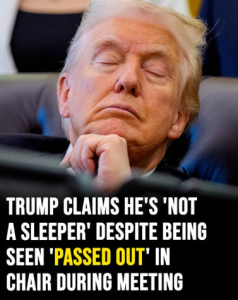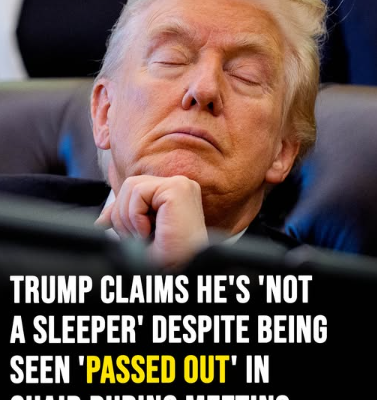
In recent days, former President Donald Trump has found himself pushing back strongly against a narrative being driven by viral photos and video: that he was “passed out” or dozing in his chair during a high-profile Oval Office event. Trump’s response has been blunt and dismissive — “I’m not a sleeper” — but the episode has reignited questions about his energy, public image, and credibility.
What Happened
The controversy centers on a recent Oval Office event where Trump appeared, on camera, to be fighting off sleep. According to video and photos reported by The Washington Post, Trump was seated behind the Resolute Desk, slouched, with his eyes closing, hand occasionally pressed to his temple — classic signs of someone drowsy or struggling to stay awake. The Washington Post
The event itself was a major one: it was tied to an announcement on lowering the price of weight-loss drugs, a health-policy initiative with real political weight. The Washington Post+1 At one point in the meeting, a man behind Trump fainted — an interruption that paused the proceedings — and afterward, Trump seemed more alert, but there were still fleeting moments captured on camera where his eyes closed again. The Washington Post+2Mediaite+2
Critics and political opponents jumped on the images, mocking him and dubbing him “Dozy Don” — an ironic twist on his earlier attacks against Joe Biden as “Sleepy Joe.” National Memo+1
Trump’s Response
Trump has not stayed silent. In a media appearance alongside Saudi Crown Prince Mohammed bin Salman, he was asked directly about his energy and time management: “How do you manage your own time and what’s your formula for management?” Yahoo+1
His answer leaned heavily into a working-all-hours trope: “He [the Crown Prince] does not sleep much, and I don’t sleep much,” Trump said, suggesting their schedules are aligned because they’re both always thinking about their countries. Yahoo+1 He went on to mock Biden, claiming his predecessor “sleeps all the time … on the beach … during the day, during the night.” Yahoo
Reasserting his point, Trump declared, “No, he’s not a sleeper. I’m not a sleeper … When you love your job, when you love your country … you’re thinking about your country. … I don’t want to sleep.” Mediaite
A White House spokesperson also weighed in, denying he was sleeping during the drug-price announcement. According to the statement, Trump spoke throughout the event and took questions from the press. The Washington Post
Why It Matters
1. Public Perception & Political Image
This isn’t just a personal matter of whether he nodded off — it cuts to Trump’s public brand. For years, he has projected himself as tireless, energetic, always “on.” By contrast, these images undercut that narrative, making him appear vulnerable, fatigued, or less in control. It’s especially potent given his frequent jabs at Biden’s age and energy, so opponents see it as poetic (or hypocritical) justice.
2. Media & Credibility
The “not sleeping” defense is a classic form of spin control: acknowledge the image but frame it in a way that preserves credibility. Whether the public believes him may depend on how much they trust the White House response vs. what they saw in the footage. In an age of social media, these moments spread fast and can shape broader narratives about competence, health, and stamina.
3. Age & Fitness
At 79, Trump is among the older public figures operating at high political stakes. Moments like this fuel ongoing conversations about his fitness — not just for office, but for the grueling demands of leadership. Critics will likely use these episodes to question whether he really has the endurance he claims, while supporters may dismiss them as overblown or taken out of context.
4. Policy Distraction
The focus on his nodding-off behavior distracts from the substantive policy being announced (in this case, drug pricing). Rather than centering coverage on the implications of more affordable weight-loss drugs, much of the media narrative shifts to his physical condition. That’s a win for critics who want to frame him as unstable or out of touch, and a potential liability for Trump.
5. Political Theater
It’s also a moment of political theater. Trump’s “I don’t sleep” line feeds into a mythos of a leader who sacrifices rest for country. Whether or not it’s fully believable, it plays to a base that admires the image of a no-rest, all-work titan. Simultaneously, it provides fodder for satire, late-night talk shows, and critics who portray him as delusional or out of touch with reality.
Counterarguments and Defense
Trump’s defenders will likely lean on a few key arguments:
-
He was never fully asleep: Closing his eyes or leaning back doesn’t necessarily mean he was asleep. Bodies fatigue, and people rest their eyes, especially during long meetings.
-
He participated actively: According to the White House, he spoke during the event and answered questions — meaning he was engaged, not zoned out. The Washington Post
-
Work ethic narrative: Trump frames himself as a relentless worker. His defense leans into this, suggesting that sleep is a lower priority because his job is to serve his country, and that drive requires sacrifices.
-
Double standard concern: Some of his supporters and allies argue that if it were his political rivals (especially those he has often criticized for age or stamina), the scrutiny would be much fiercer, and media coverage more relentless. Indeed, critics have pointed to how Democrats and others responded when Trump’s predecessors showed signs of frailty. The Washington Post+1
Risks and Potential Fallout
-
Mockery & Memes: This kind of image is tailor-made for social media mockery. Memes, nicknames (“Dozy Don,” “Nodfather,” etc.), and viral clips can erode authority and make him look less formidable.
-
Policy Overshadowed: Because the moment took place during a drug-price announcement, there’s a risk the policy news gets lost in the spectacle, reducing the perceived gravity of the initiative.
-
Political Attack Lines: Opponents can and will use this as material in campaigns, debates, and media coverage to question his mental alertness and leadership capacity.
-
Credibility Erosion: If these kinds of incidents accumulate, they could chip away at his credibility. Even if defended, repeated moments like this may sow doubt among more moderate or undecided observers.
-
Health Questions: While not the same as a formal health evaluation, repeated public nodding-off can raise genuine questions about his physical endurance, especially at his age.
Broader Significance
This isn’t the first time Trump has faced claims of nodding off in public settings. He has been observed appearing sleepy in previous meetings, trials, and events: for example, during his hush-money trial, some reporters said he appeared to doze off. Forbes And the pattern feeds into a longer-running narrative debate about presidential energy, age, and fitness — topics that are always politically potent, especially for someone who has built part of his brand on being stronger, tougher, and more vigorous than his opponents.
In a sense, this moment is a microcosm of modern political communication: image matters, optics matter, and in the age of constant camera coverage, brief glitches — or perceived glitches — can balloon into major controversies. The ability to spin, deflect, and reframe is crucial. Trump’s “not a sleeper” line is exactly that — an attempt to reassert control over how the moment is perceived.
My Take
-
Trump’s defense makes strategic sense: he leans into his long-standing “workaholic” persona, recasts the narrative to emphasize dedication, and pushes back at critics by mocking his critics’ energy (i.e., Biden).
-
But there’s a risk: if these moments keep happening, they could undermine that narrative. Repeated on-camera fatigue erodes confidence, particularly when the public already questions his stamina and capacity to lead.
-
Even more, by shifting focus to his sleep, the serious policy moment (drug price cuts) risks being overshadowed. That could undercut his ability to shape the message of the event in the way he wants.
Bottom line: Trump’s “I’m not a sleeper” response is a calculated counterattack to a rising narrative that he’s dozing off in important moments. He’s doubling down on the idea that he’s always working, sacrificing rest for country — but the optics are tricky, and the public’s willingness to buy that explanation isn’t guaranteed. Whether this becomes a footnote or a defining meme of his presidency may depend on what happens next.

